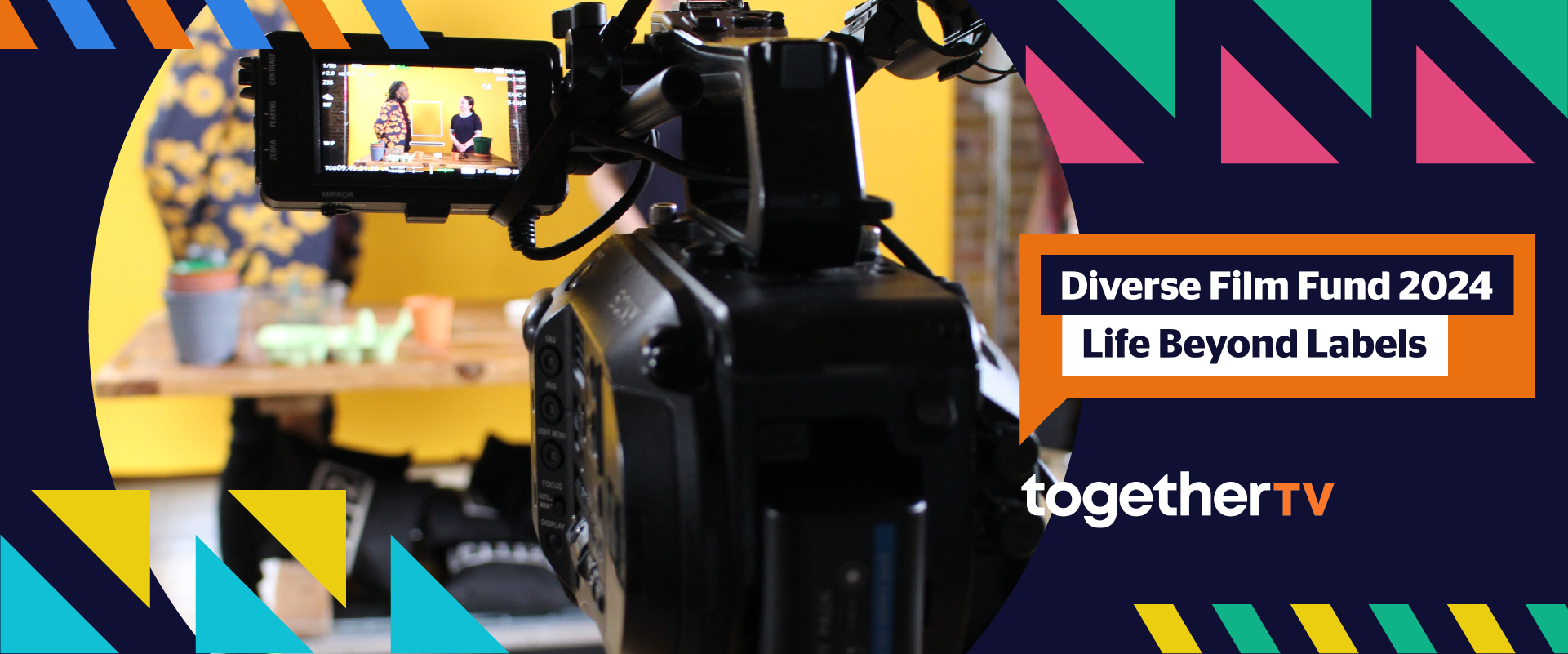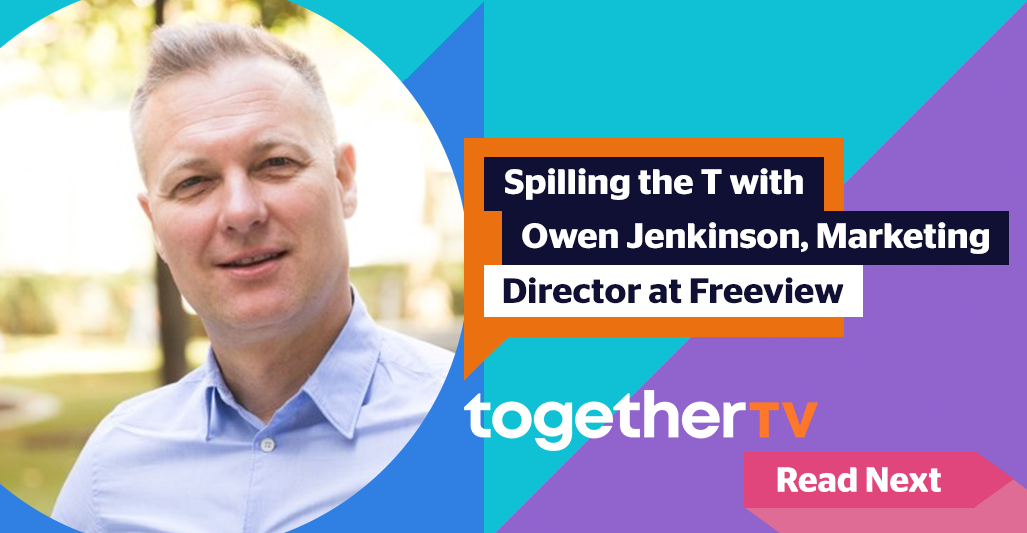Francesca Aita, Together TV’s Head of Marketing, grabbed a cuppa with BSLBT’s Chief Executive, Camilla Arnold, as Together TV’s partner for the Diverse Film Fund 2024 for deaf, disabled and/or neurodivergent creatives, to ‘spill the T’. BSLBT (the British Sign Language Broadcasting Trust) is the TV industry’s unique broadcaster aiming to increase the availability of BSL television for deaf BSL users.
Camilla divulges on her experience as a deaf person working in broadcasting, the “Rose” effect and the changes that need to be made for more inclusivity.
Francesca Aita (Head of Marketing, Together TV): To get started, would you like to share your professional path and the roles you have covered over the years?
Camilla Arnold (BSLBT's Chief Executive): I've had quite a traditional career path. My first mainstream break was a programme called Magic Hands, which was for CBeebies. It was the first time we have seen sign language fully integrated in a children’s TV series in the UK. It became one of the BBC’s CBeebies flagship programmes, so I'm really proud of that and of the fact that we made history. Before I joined the BSLBT team, I worked at the BBC on a series called See Hear, which is a magazine programme for deaf and hard of hearing people. I was the first deaf female series producer for BBC Studios. It was also during the pandemic, so it was a very challenging period to take that programme on but it’s an achievement that I was proud of.
Francesca: Is there a specific proudest moment from your professional life?
 Camilla: I'm a big champion for diversity. Not just on screen, but behind the screen as well. I'm particularly proud of my involvement in nurturing deaf talent. A defining moment where I saw my work come together was when I worked on a series for BSLBT, called Coffee Morning Club, made by Mutt and Jeff Pictures. 70% of the crew behind the camera were deaf. This was because of all the hard work - not just my work but the work of others - that has gone into developing deaf talent, giving people opportunities. It has been such a pleasure to see deaf people work their way up the ladder.
Camilla: I'm a big champion for diversity. Not just on screen, but behind the screen as well. I'm particularly proud of my involvement in nurturing deaf talent. A defining moment where I saw my work come together was when I worked on a series for BSLBT, called Coffee Morning Club, made by Mutt and Jeff Pictures. 70% of the crew behind the camera were deaf. This was because of all the hard work - not just my work but the work of others - that has gone into developing deaf talent, giving people opportunities. It has been such a pleasure to see deaf people work their way up the ladder.
Francesca: What is the best piece of advice that you have ever received?
Camilla: I've always been told, “you've got to enjoy yourself.” I think you must see the fun in your job if you can. That's something I've always kept with me as work is such a big part of our lives. We live in a very high demand, high pressure world. What has kept me going is the fact that I love what I do. I love meeting people and telling stories. That passion that I've had has never gone away. I think that's what's really important: have fun, enjoy yourself.
Francesca: As a Deaf person, how do you find working in the TV industry?
Camilla: When I first joined the TV industry, they weren't ready for deaf people to be a part of it at all. Deaf people were working in kind of ad hoc roles, fairly junior roles. We’ve had to really fight.
I'm proud that we are catching up in terms of skill set, but opportunities are still far and few. That's why I'm here at BSLBT. I'm here because I would like to start having these high-level conversations with broadcasters, commissioners and a variety of channels to say, “look, you need to be investing in deaf people and to have deaf people be involved in your work. It's a reciprocal agreement: we will give you access to a world of stories that have never been shown before, and your content will get an alternative perception on the same old stories.”
Francesca: What do you think would really be a game changer?
Camilla: Well, change always starts from the top, as cliché as it sounds. I'd love to see deaf commissioners, deaf Heads of Factual, Features, Documentaries and so forth at major broadcasters such as BBC, Channel 4 as that's where the decisions are made. They can champion the content that involves deaf people.
I think the other issue is that there are deaf directors, but they are pigeonholed. The programmes that they work on are only about deaf people which is fine - but there's a bigger world out there for us. I would love to direct a series of Bake Off for example! Why can’t I, as a deaf director? I would love to see those opportunities being given. That starts from the top, from a commissioning level. That's where change begins.
Francesca: So, what is the role of BSLBT in today's TV broadcasting landscape?
Camilla: BSLBT is a commissioning body. We commission programmes targeting deaf BSL users. However, with the new change in management, we're thinking bigger.
BSLBT is in a position where we should be having more conversations and educating the mainstream audiences, programme makers and commissioners. We will be taking on more of a consultancy role within the landscape with key stakeholders, bringing the deaf experience to them and also challenging preconceived ideas. I would like to see more content and that upscales deaf people. I believe we have the duty of identifying, nurturing and fostering deaf talent before they go off into the mainstream.
Francesca: What do you think of the moment in 2021, when deaf actress Rose Ayling-Ellis did a silent dance with Giovanni Pernice on Strictly Come Dancing?
Camilla: It is interesting. We call it the “Rose halo effect”. It's a ripple effect from that silent dance.
Rose just happens to be deaf. She was a very likeable character and came across well. Her appearance in ‘Strictly’ normalised deafness and the use of sign language interpreters. I think what she did was incredible, and she has had a big impact. However, at the same time, it is important to remind people that there's so much more that is happening out there.
I think the world needs to remember, there's more to deaf people than Rose. Rose represents part of the deaf community, but one person cannot represent an entire community. And I think that is something that people need to remember.
Francesca: After Rose’s effect, what would you like to see and what do you think BSLBT or any other organisations who are allies can do?
Camilla: I would like to see “Deaf allies” actually behave like allies, giving opportunities, listening to the Deaf community and opening doors for us. It's hard as a deaf person, especially in the television industry, to elbow your way through.
In terms of commissioners, we'd love to see a documentary, series or a mainstream format that has more than one deaf person in it. Channel 4 recently had the deaf Bake-Off contestant, Tasha. That was a good example of a deaf person within a mainstream format. There was no big song and dance about her deafness. It was the right approach to take and I’d like to see more of that.
I've seen more and more stories cropping up about the Deaf community, which is brilliant. But there's the saying “Nothing about us without us”. Unfortunately, we are seeing stories being covered about deaf individuals, but there's no deaf involvement behind the scenes. And that is where it becomes dangerous. We need to ensure the production companies and broadcasters are using deaf consultants, deaf producers, deaf directors to support them with their productions.
Somebody told me recently a story about a documentary made about a deaf individual. They brought in a deaf member of the production team, which was the right thing to do. But they didn’t use the individual in the right way; unbelievably, they asked them if they could be the sound person on shoot to save cost. I’m sure the irony of asking somebody who is deaf to monitor sound is not lost on you. This just shows the astounding lack of awareness that still prevails in our industry unfortunately. The cherry on top was when on the same production, the producer was texting a deaf person to check, “Did you listen to the radio interview about this promotion?” So as ridiculous as this example may sound, it is happening out there in the mainstream on high profile things. People reading this, please reach out to me if you have any questions. We're here to support you. Please do things properly!
Francesca: BSLBT has been in partnership with Together TV for a very long time, what do you think this means for the audience that BSLBT represents?
Camilla: It's a collaboration that goes back a very long way. And it's a vital relationship for us. Together TV is one of the platforms that allows BSLBT programmes to be shown to the world. Our history goes way back to the very beginning of BSLBT, and I think it's important that we continue to nurture that relationship going forward. Together TV have championed diversity and different minorities, and that's why Together TV is such a perfect home for our programmes to go out on. It's a relationship we're proud of.
Francesca: We have recently announced that BSLBT is a partner for Together TVs, Diversity Film Fund. What do you hope to achieve with this initiative from a BSL perspective?

Camilla: We're thrilled to be a part of the Diverse Film Fund and I think it's important that we are part of this and part of these conversations, because it's an opportunity for deaf filmmakers to bring their ideas that will go out on a mainstream platform. It will have a wider impact and it’s important that these stories don’t just stay within the BSLBT core community audience. This is the opening up of doors to a wider audience. It's an opportunity to share stories as well as skills development. I think it’s a fantastic initiative!
Francesca: What do you think of the role that Together TV plays in the media ecology?
Camilla: The media landscape is currently quite unstable. There's a lot of changes, but the Media Bill is coming. I see how Together TV, the work you do and the relationships you have can play an advocacy role. I know you have conversations with the BBC and other broadcasters, and I think your position in the TV ecology is really important. I think we're living in a world where people are starting to listen and changes are starting to happen, people are becoming more open minded. Hopefully, Together TV can filter into all the relevant conversations and open up even more opportunities and platforms for our content and others’ content to reach a wider audience.
Francesca: A pass-it-along question provided by a previous guest asked, what is the best thing you've ever seen on TV?
Camilla: I've seen so many fantastic things, so it’s quite difficult to narrow it down to one. I'm going to have to say it’s The Traitors at the moment. It's fantastic! It's a brilliant format, is easy watching and it's got everybody gripped.
Revisit other editions of ‘Spilling the T’ to discover the bold happenings at Channel 4 with their Head of Media, Jennifer Carey. Or, Freeview Marketing Director, Owen Jenkinson, discussing why TV can be a force for good.
Did you enjoy this interview? Get more insights straight into your inbox:


























